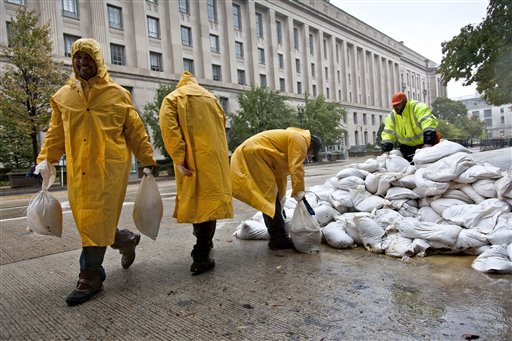BBG Colleagues Carry out Their Mission in Spite of Hurricane Sandy’s Many Hazards


Federal government offices and other workplaces in the Washington region shut down during Hurricane Sandy, but the dedicated men and women working in U.S. international broadcasting forged ahead, overcoming obstacles including a lack of public transportation and dicey commutes, some from great distances.
The Broadcasting Board of Governors was ready with a plan of action when the Office of Personnel Management announced on Sunday night that government offices would be closed the next day. BBG-supported services continued to operate through Monday and Tuesday amid buffeting winds and downpours day and night.
“These brave souls showed incredible grit in carrying out our mission,” said Richard M. Lobo, director of the BBG’s International Broadcasting Bureau. “We owe them a great debt of gratitude, and we know that their viewers, listeners and online readers around the world appreciated the result.”
Voice of America provided news and information programs in all of its 43 languages, with every show airing on schedule. People worked around the clock as usual, staying on cots and couches in DC’s historic Cohen Building where the service is headquartered, as well as at nearby hotels.
“It was extraordinary,” observed VOA Director David Ensor, a veteran broadcast journalist. “Hundreds of programs went out. We never missed a beat.”
VOA had a reporter on a beach in New Jersey, where the storm made landfall, as well as analysis of how the situation affected the presidential campaigns and a first-person account of what it was like to be trapped in an apartment in New York City while water flooded the streets; a videographer living there uploaded exclusive footage to Washington just before she lost power.
Coverage of world events continued as usual in spite of the hurdles at VOA’s headquarters and for colleagues along the Eastern Seaboard.
At the Springfield, VA headquarters of the Middle East Broadcasting Networks, home to Radio Sawa and Alhurra TV, most employees came for both days, some for back-to-back shifts. For each shift the person on duty stayed until his or her replacement arrived, ensuring operations were covered at all times.
Cots were set up in the second-floor conference room in case anyone needed to use them overnight. One studio assistant overnighted on a cot in the edit suite between handling her own shift and that of a colleague who was unable to get to work. A lighting director slept in his truck near the office to ensure that the lighting was right for evening productions on Monday and the start of Tuesday’s programming. And the operations manager worked a full shift, then stayed on for a second one that extend halfway into a third; he left only when a technician arrived four hours early to relieve him.
Staff for Radio Free Asia in downtown DC arrived on Sunday and stayed overnight to ensure that RFA broadcasts continued uninterrupted. This skeleton crew had to perform numerous tasks to ensure timely delivery of the news. Others went to great lengths to get to work; for example the husband of a Cantonese Service staffer used a chainsaw to cut through a fallen tree that was blocking a street so she could drive in to the office on Tuesday morning.
Washington-based newsroom correspondents for Radio Free Europe/Radio Liberty worked through the storm, as well.
Meanwhile, technicians, human resources, administrative and other staff for the BBG and IBB who needed to be on hand at headquarters arrived in significant numbers, while many others at all levels of the agency telecommuted throughout the storm to keep vital services going and priority efforts on track.
